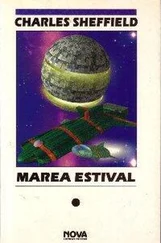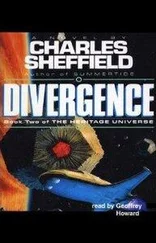She glanced at the display showing elapsed time. Only nine minutes since first thrust. It felt much longer.
“Looking good.” Zoe sounded a fraction fainter, but maybe that was Celine’s imagination. “We are losing altitude as planned and are already experiencing atmospheric drag. We project loss of radio contact in five minutes and seventeen seconds, eight seconds ahead of schedule. Report back receipt of this signal.”
Celine did so, automatically. The Earth below was invisible. It was still night there, though in another nine minutes Celine would look down onto a sunlit United States. Lewis was heading for a single-step reentry. There would be no “bounce” aerobraking as they had used it on Mars, skimming into the upper atmosphere and out again several times, like a pebble skipped across the surface of a lake and shedding velocity on each transit. The Earth orbiters and landers all accomplished reentry in a single pass. Aerodynamic and thermal forces were much greater that way, but the ships were designed to take it.
“The hull indicates an increase over predicted temperature,” Zoe said. Her voice was overlaid with the faintest hiss and crackle. “Parameters are still within the predicted range. Ionization is beginning, somewhat ahead of schedule. We expect radio blackout in two minutes and eleven seconds, seventeen seconds ahead of schedule. Report back receipt of this signal.”
Celine glanced at the other three in the control room. Jenny was serious, following the flight parameters coming over the telemetry and nodding approval. Reza was smiling, moving his hands as though he were flying the Lewis himself. Wilmer alone seemed worried, his hand to his chin and his heavy brow furrowed.
“Hull temperature is rising more rapidly.” The distortion in Zoe’s voice was greater. “It is a good deal more than predicted. I have to lessen the angle of attack and I project a change in downrange landing distance. I am taking manual control of orbiter attitude. We expect radio blackout in fifty seconds.”
More than a minute ahead of schedule. Much too soon.
“Refer to visuals,” Jenny said softly. Celine looked at the display from the big scope and saw on it a bright arrow trail. The Lewis was the silver tip at the head of the arrow.
Celine gave one rapid glance at the unmagnified display. The tiny mote of the Lewis, a hundred and more miles beneath the Schiaparelli, was not visible. She said urgently, “ Lewis, we are losing radio contact. Report if you are hearing us.”
The radio signal telemetry sounded in her ears as a loud hiss of static, within which every trace of Zoe’s voice had been lost. The control board provided the real-time power spectrum of the telemetry, and it was pure white noise.
“They are entering the period of maximum drag and maximum ionization,” Celine said — an unnecessary comment for the others in the control room, who knew it as well as she did, but needed for a full record of events. “This has occurred sixty-six seconds ahead of prediction. Radio contact has been lost.”
The display from the big scope also showed the nominal flight trajectory for the Lewis as it had been calculated ahead of time. The two curves, computed orange and observed yellow, were diverging. Celine could see the separation increasing as she watched. The real ship was falling far behind its simulated twin.
“The atmospheric drag force is way high,” Wilmer said suddenly. “The reentry angle must be too steep. It’s as though they made an attitude correction the wrong way.”
It was useless to ask how he knew — he had his own inexplicable way of making estimates. It was also pointless. The big scope was still providing its display. As Wilmer was speaking, the silver arrow tip brightened.
“Black body equivalent temperature of Lewis’s hull, forty-two hundred degrees,” Jenny said. She was reading the output of the Schiaparelli’s bolometer. “That exceeds predicted maximum by six hundred degrees.”
Still well within tolerances. The exotic materials of the orbiter’s hull were rated up to fifty-four hundred degrees. But a normal reentry never came close to that. And Celine did not need the bolometric output to tell her that the temperature of Lewis’s hull was still increasing. The silver arrowhead had become a blaze of blue. Telemetry was a roar of static in her ears.
“Go up ,” Reza said urgently. He was working imaginary controls, pulling back on them. “Forget the one-shot reentry. Go higher, take another shot later.”
Radio silence was two-way. There was no chance that Zoe Nash could hear him. Frictional heating surrounded the racing orbiter with a blaze of ionized gases.
“Black body equivalent temperature of Lewis’s hull, six thousand degrees.” Jenny’s voice was a dead whisper. Then, with urgency, “Cool down. You can’t take that for long.”
She was right. As she spoke, the blazing arrow tip vanished. It was replaced by a puff of white, round and delicate as a cotton ball.
Celine did not cry out. She leaned forward and covered her face with her hands. That innocuous cottony cloud was an incandescent rage of flaming gas. In its heart were Zoe Nash, Ludwig Holter, and Alta Mclntosh-Mohammad, reduced to their component atoms in Lewis’s fiery explosion.
They would be carried away by the pendent winds, blown and dispersed by the restless violence of the atmosphere. If the three crew reached a single final landing place, no one would ever know it.
The control room was silent except for Reza’s harsh breathing. Celine rocked backward and forward, unable to weep or to make any sound. All she could think was that Zoe, supercapable and superconfident Zoe, had been wrong.
Zoe would not be down on Earth in two days. Zoe would not be there ever.
The snow had ended. The wind was dropping away to nothing, and with the loss of cloud cover the night had become bitterly and unnaturally cold.
The ancient frigate chugged south at a leisurely eight knots, while at the bow Saul Steinmetz stood hatted, gloved, and swaddled in winter clothes. His brain was buzzing after a two-hour whirlwind of snap executive judgments that everyone else in government seemed too scared to make. One side effect of Supernova Alpha was Saul’s own apparent apotheosis. No one questioned his authority to do anything.
The buck stops here. Good old Harry Truman, he said it better than anybody. But it would be nice to think you were making right decisions.
Saul was alone, but not, he was sure, unobserved. Even if the frigate crew could conquer their natural curiosity at having the President on board, his security staff were still on duty.
One week ago, heavy rains had pushed the river far above flood stage. The level was lower now, but when the snow melted the waters would rise again, farther than ever. The only evidence for wild conditions upstream lay in the large amount of carried sediment. At night, the heavy suspension of reddish mud did not show. The water lay thick and black as oil, parting smoothly before the old warship’s advance.
Saul stared downstream. A light was blinking there, alien in its slow staccato. A warning? No, a message, that was much more reasonable. A message intended for this ship?
Peering at the point of light and wondering about its meaning, Saul allowed his mind to wander away to more personal questions. Was he going to learn something, as he believed, or was he running away? A thousand things needed doing back in his White House second-floor office. Auden Travis was the most diplomatic of aides, but his face had made his views clear when Saul said where he was going. There had been some kind of fight between Auden and Yasmin Silvers. Maybe tonight Saul would learn the cause.
Читать дальше












